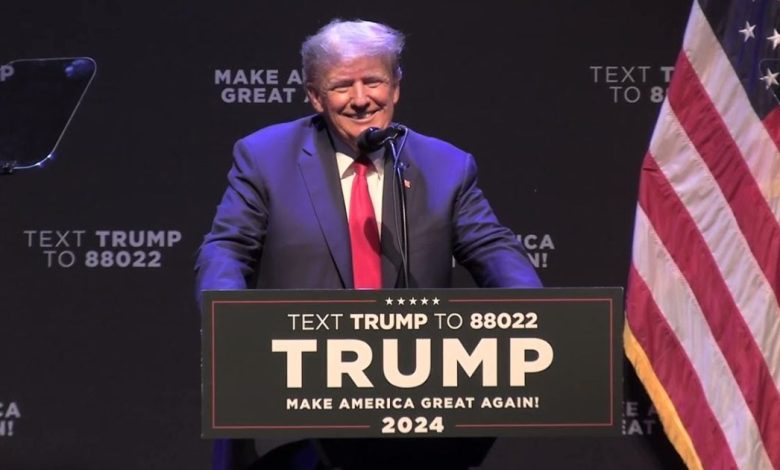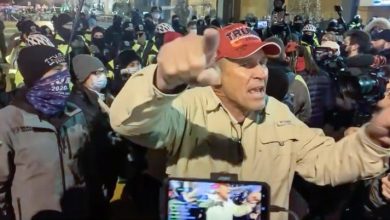Trump May Deploy “Ironic” 1795 Law To Clean Up America

Occam’s Razor says that the simplest answer is usually correct.
Elon Musk often jokes that the most “ironic” outcome is usually the most likely to occur.
And he might just be right on this one.
What is the one word the Crooked Media and Crooked Congress has tried to sink President Trump with since January 2021?
“Insurrection”
In that context, people afraid that President Trump will win again (big league) in 2024, have tried to use the “Insurrection Clause” of the 14th Amendment to bar him from the ballot:
- Prohibition Against Holding Office: Section 3 of the 14th Amendment states that no person shall hold any office, civil or military, under the United States or under any state, who, having previously taken an oath as a member of Congress, or as an officer of the United States, or as a member of any state legislature, or as an executive or judicial officer of any state, to support the Constitution of the United States, shall have engaged in insurrection or rebellion against the same, or given aid or comfort to the enemies thereof.
Of course we know that’s completely bogus, but did you know there is actually a different law on the books from 1795 called The Insurrection Act?
Totally different thing, and the irony above all ironies is that President Trump may deploy it on Day 1 of his Presidency to clean up America:
The Insurrection Act of 1795 is a United States federal law that empowers the President to deploy U.S. military and federalized National Guard troops within the United States in specific circumstances, such as to suppress civil disorder, insurrection, and rebellion. The key aspects of this act include:
- Authorization for Use: The Act allows the President to use the armed forces to address an insurrection in any state which requests it, or in situations where it’s necessary to enforce federal law.
- Conditions for Deployment: Before deploying troops, the President must first issue a proclamation ordering the insurgents to disperse within a limited time. If the situation does not resolve after this proclamation, the President can then use military force.
- Historical Context: Enacted in 1795, the law was a response to the Whiskey Rebellion, a 1794 uprising against federal tax collections in western Pennsylvania.
- Subsequent Amendments: The Act has been amended several times, most notably by the Posse Comitatus Act of 1878, which limits the use of military personnel under federal command for law enforcement purposes within the United States.
- Modern Usage: The Insurrection Act has been invoked on several occasions throughout history, including during the Los Angeles riots in 1992 and in response to Hurricane Hugo in 1989.
America has become a third world country.
Our major cities are not even safe to walk in any more.
Have you seen this from Chicago?
Chicago has fallen. Third world
Shithole!— DailyNoah.com (@DailyNoahNews) September 17, 2023
Or this filth from New York?
Breaking News:
Democrats Piss Themselves on Trains Now… pic.twitter.com/oBdPGn6RF7
— Rob/1865 (@Rob1865_) November 28, 2023
Or this TERRIFYING attack on a woman in Chicago?
THIS IS THIRD WORLD COUNTRY SHIT! Lock these thugs up or just execute them if needed….YES or NO? https://t.co/tAUZsRlQsA
— DailyNoah.com (@DailyNoahNews) November 28, 2023
Time to clean it up, and President Trump is just the man to do it.
Here is The Associated Press:
“You look at these great cities Los Angeles, San Francisco you look at what’s happening to our country… We cannot let it happen any longer. And one of the other things I’ll do.. Because you know you’re supposed to not be involved in that you just have to be asked by the governor or the mayor to come in…
The next time, I’m not waiting. One of the things I did was let them run it, and we’re going to show how bad a job they do,” he added.
You can see the clip in this speech at the 1:50:00 mark — the play button should cue it up right to that spot:
Here’s more from the Associated Press on how it may play out:
The Insurrection Act allows presidents to call on reserve or active-duty military units to respond to unrest in the states, an authority that is not reviewable by the courts. One of its few guardrails merely requires the president to request that the participants disperse.
“The principal constraint on the president’s use of the Insurrection Act is basically political, that presidents don’t want to be the guy who sent tanks rolling down Main Street,” said Joseph Nunn, a national security expert with the Brennan Center for Justice. “There’s not much really in the law to stay the president’s hand.”
A spokesman for Trump’s campaign did not respond to multiple requests for comment about what authority Trump might use to pursue his plans.
Congress passed the act in 1792, just four years after the Constitution was ratified. Nunn said it’s an amalgamation of different statutes enacted between then and the 1870s, a time when there was little in the way of local law enforcement.
“It is a law that in many ways was created for a country that doesn’t exist anymore,” he said.
It also is one of the most substantial exceptions to the Posse Comitatus Act, which generally prohibits using the military for law enforcement purposes.
Trump has spoken openly about his plans should he win the presidency, including using the military at the border and in cities struggling with violent crime. His plans also have included using the military against foreign drug cartels, a view echoed by other Republican primary candidates such as Florida Gov. Ron DeSantis and Nikki Haley, the former U.N. ambassador and South Carolina governor.
What do you think?


